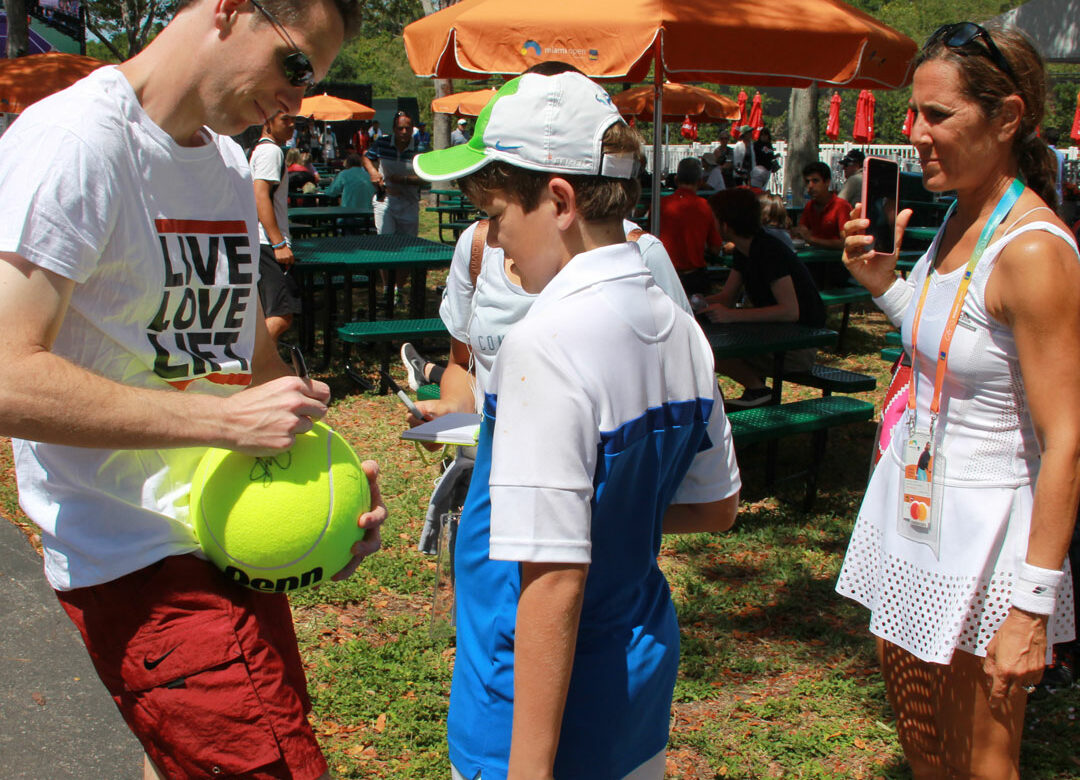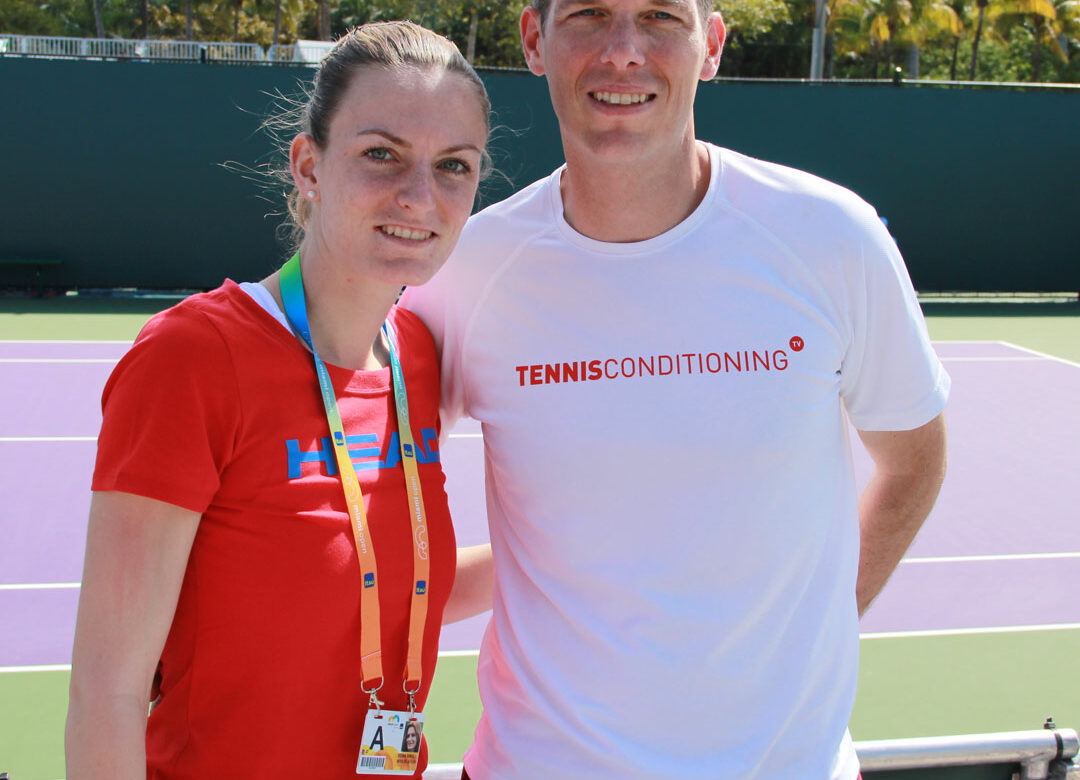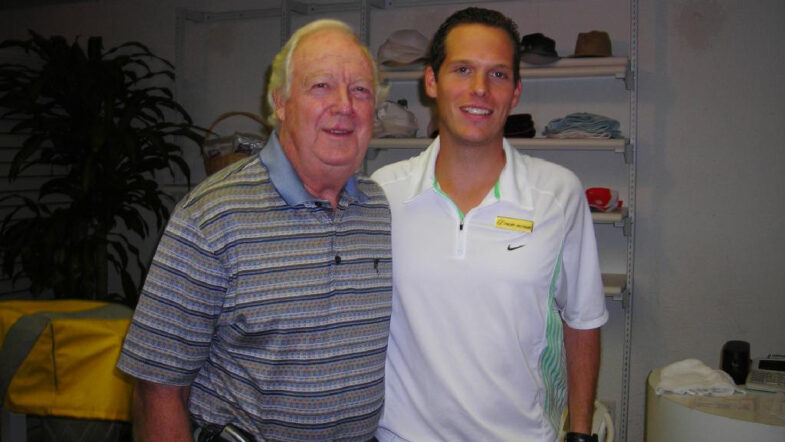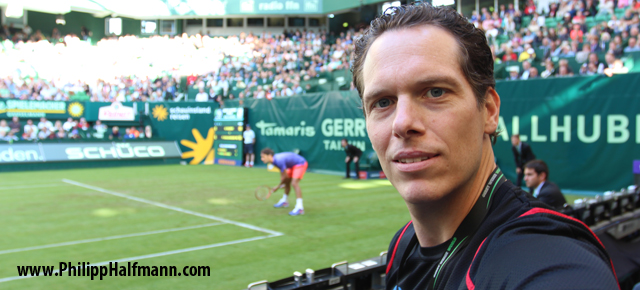I’m at a point in my life where I’m reviewing my accomplishments and want to share some of my experiences and opinion along the way. Towards the end I also provide some food for thought.


As a player I was decent. When I was a junior I was amongst the best players in my state and made it to the “Westfalenmeisterschaften” in Germany.
In men’s tennis in Germany I made it as far as “Oberliga” (4th highest division) and in the US I played very successful NCAA (Division III) but my focus at that time was mainly on my studies…tennis was just for fun.
To make a long story short, I finished my master’s degree in Exercise & Sports Science in Miami, worked with collegiate (NCAA Div 1) and professional athletes (tennis & NBA players).
Fred Stolle Knows How To Hit A Volley

With regards to tennis I learned a lot from Australian tennis legend Fred Stolle and Owen Davidson (e.g. “you learn how to volley at the (tennis) wall, not on the court”), while working as the Head Tennis Professional at the Turnberry Isle Resort & Club in Miami, before I met Alexander Ritschard at a Junior ITF tennis tournament in Miami.
Alex was 14 years old at the time when I became his coach (tennis + strength & conditioning) and we started working together for 6 years.
During my time as his coach, I was responsible for the following:
- Designing and implementing strength & conditioning programs on tour and at home thereby minimizing injury-related breaks to less than 2 weeks annually
- overall player development, including tennis, fitness, massage and taping
“Nutrition” was Alex’s mom, Heidi, ressort.
The tennis specific training (e.g. stroke productions) was developed in consultation with his father, Hans Ritschard, also a former ATP tour player (top 200).
We agreed Alexander needed to have a full arsenal of shots if he was to become a successful tennis player who could beat a e.g. Roger Federer…slices, drive, topspin, drop shot for groundstrokes, swinging and “classic” volleys and flat, kick or slice serves.
Alexander had an aggressive style of play with tremendous ground strokes…but how are you supposed to continuously beat “ball machine” type players and win a tournament (not simply a match) if you cannot finish the point at the net? Exactly, you can’t!
Hence you must learn how to volley “like a wall”. How do you do that? One way is you show your athlete the proper stroke mechanics (e.g. continental grip, point of contact in front of the body, etc.), then you find a “tennis wall” and have him/her practice volleys for 5 minutes/training session.
Because you are a great coach you are familiar with training intensities and rest intervals, right? So, you watch and make sure the athlete performs in perfect form and doesn’t get sloppy with the execution.
Then you incorporate volleys into your on-court tennis training drills and during match training he/she has the task to play serve and volley from time to time and/or finish 1-2 points/game at the net.
During training blocks we would train tennis 2x/day, which meant 10 minutes of volleys/day at the wall…5 days a week…in addition to the aforementioned tennis drills & match training and after 2-3 months your player knows how to volley properly…as if he/she was Australian.
From a strength and conditioning perspective we were working on the “Ideal Tennis Player Body: Lean Mean Machine”.
More specifically, we were working on improving:
- footwork
- explosiveness
- speed, agility and quickness
- energy transfer
- flexility
- conditioning
We achieved continuous improvements because, amongst other factors, Alexander stayed healthy during the process.
As a result, Alexander:
- Won Swiss National Junior Championships 4 years in a row, singles and doubles
- Won first ATP point at age 16, which was accomplished by only five players
worldwide in 2010 - Improved junior ITF ranking by 600 spots in 12 months and reached a high of 65
- Reached career high ATP ranking of 648 at age 17
- was offered a full scholarship and won the 2015 NCAA Men’s Tennis
Championship with University of Virginia (UVa)
Swiss Tennis
During my time working with Alexander I had the privilege of living in Zurich, Switzerland, and getting to know a lot of people at Swiss Tennis in Biel.
Roger Federer & Martina Hingis were doing well at the time, Stan Wawrinka wasn’t doing much worse either, and Alexander had the privilege to be invited to practice with Swiss Tennis top players.
For me it was a privilege to get to know most members of their coaching teams. Beni Linder, for example, was Head Strength & Conditioning Coach for Swiss Tennis at the time and we had a lot of interesting conversations since I published my book at the time (Advanced Concepts of Strength & Conditioning for Tennis).
At that time Swiss Tennis top male junior players were:
- Dimitri Bretting (Career High 1089 on 05.19.2014)
- Claude Benz (Career High 1061 on 09.19.2011)
- Vullnet Tashi (Career High 790 on 07.23.2018)
- Jens Hauser (Career High 1186 on 05.26.2014)
- Daniel Valent (Career High 1580 on 08.29.2022)
Coaching Staff
- Roland Burtscher (Head Tennis Coach)
- Beni Linder (Strength & Conditioning Coach)
University of Virginia (UVa)
Because of his promising style of play and accomplishments Alexander was offered a full scholarship at the University of Virginia (UVa) in Charlottesville by then Head Coach Brian Boland.
UVa Men’s Tennis program was considered top 3 in the nation at the time and the team consisted of the following players when I was there (2014):
- Collin Altamirano (Career High 458 on 11.30.2020)
- J.C. Aragone (Career High 224 12.17.2018)
- Luca Corinteli (No ATP ranking)
- Jonathan Cornish (No ATP ranking)
- Mitchell Frank (Career High 503 on 10.27.2014)
- Thai-Son Kwiatkowski (Career High 181 on 02.03.2020)
- Harrison Richmond (Career High 1,371)
- Alexander Ritschard (Career High 163 on 09.12.2022)
- Ryan Shane (Career High 333 on 07.29.2019)
- Mac Styslinger (Career High 1066 on 07.22.2013)
- Henrik Wiersholm (Career High 838 on 11.21.2016
Coaching Staff
- Brian Boland (Men’s Tennis Head Coach)
- Dustin Taylor (Men’s Tennis Assistant Coach)
- Pat Etcheberry (Strength & Conditioning Coach)
While I was at UVa with Alexander in 2014 we had the privilege of practicing at their facilities on campus and at Boars Head.
I had some meetings with Head Coach Brian Boland about how I could help the team in the future with strength & conditioning; Alexander was not part of the official team yet.
Once Alexander became a member of the official team roster that same year training was conducted by the UVa coaching staff and I was taking a backseat as to comply with NCAA regulations at the time.
At the end of the day I didn’t stay and left UVa in March of 2015. Also my coaching career with Alexander came to an end.
DTB
Since I live close to the Leistungszentrum in Kamen and Daniel Masur, same age as Alex, trains in Kamen and knows Alex from Junior ITF tournaments we were invited by Jens Woehrmann to stop by and practice from time to time.
Marvin Netuschil was also practicing in Kamen, who was just 3 years older, and Johannes Haerteis was one of the players at the Tennis Base in Munich.
Jan-Lennard Struff was also training in Kamen at the time but was much older and more successful at the time.
Other notable junior players were Matthias Wunner, Maximilian Marterer (both Niedersachsen Leistungszentrum) and Julian Lenz.

Alexander beat Matthias Wunner 3:6/7:6/6:3 in the finals of the junior event at the BMW Open in Munich 2011, which granted Alexander a Wildcard for the following year’s ATP tour tournament in Munich.
Here are the highest rankings of the aforementioned players:
- Jan-Lennard Struff (Career High 26 on 05.22.2023)
- Daniel Masur (Career High 176 on 03.07.2022
- Marvin Netuschil (Career High 306 on 06.19.2017)
- Johannes Haerteis (Career High 335 on 07.25.2016)
- Matthias Wunner (Career High 628 on 11.24.2014)
- Julian Lenz (Career High 162 on 06.21.2021)
- Maximilian Marterer (Career High 45 on 08.13.2018)
Alexander reached a career high ATP ranking of 163 (09.12.2022) and won the NCAA Men’s Tennis Championship 2015, 2016, 2017 with the University of Virginia (UVa).
Alexander beats Jan-Lennard Struff 7:5/7:5, Germany’s new Nr.1, in Munich in April 2023.
What I’m Proud Of
Unlike many other coaches, I only had Alexander to work with and I’m proud that he learned all the basics and has a great foundation so he can compete with the best in the world and pursue his dreams as a professional tennis player.
Alexander was able to win a set against two top 10 players (Stefanos Tsitsipas & Felix Auger Aliassime) at Grand Slams in 2022 and he had to qualify first.
Not only can he compete at the Grand Slam level but he also has a Bachelor’s degree from an Ivy League school in the USA, which allows him to do whatever he wants after his professional career has ended.
While working with Alexander I also wrote and published my book, basically sleeping 5-6 hrs/day for 3 years.
When you look at all the players of Swiss Tennis at the time you’ll notice none of them made it on tour…none of them reached Alexander’s spot at age 17 of 648. They also couldn’t do it as adults.
When you take a look at all his teammates at UVa you’ll notice Alexander reached the highest ranking (163 ATP) so far.
He can take sets off top 10 players and beat Germany’s Nr. 1 recently.
Conclusion
So, in conclusion:
- I have a bachelor’s in business administration from Baruch College (top university in the USA)
- a master’s degree in exercise & sports science from Florida International University (FIU)
- wrote & published 2 books in the field of strength & conditioning
- was a decent player myself
- learned tennis from an Australian tennis legend (Fred Stolle)
- learned strength & conditioning from Mick Smith (15 year NBA veteran strength coach & also worked with Monica Seles)
- taught at universities in the US
- worked with NCAA division 1 athletes, NBA players and tennis professionals
Wherever I went, FIU or UVa or working with Alex, I always delivered outstanding results without causing injuries, no matter what.
I have shared my knowledge online, for free via text and videos and thousands of people visit my website every month.
Here Is Some Food For Thought
- Why is it that I don’t have a permanent job working with professional athletes?
- Why is that I “only” had one player to work with? Don’t I deserve more even though I had a 100% success rate? Especially when you take a look at the success rate at Swiss Tennis, UVa or the DTB?
- When you look at my accomplishments is it too much to ask to receive a 1 or 2 year contract, with benefits, to develop athletes?
- Why is it that I’m not wanted to teach in Germany even though they supposedly need teachers “desperately”?
Bare in mind that other e.g. national federation players have 3 coaches who do what I do and also have access to a pool of great players at the high performance training centers.
I appreciate your feedback…maybe you know something I don’t?
But before you make a decision I invite you read the following article.
FYI: Alexander was 20 years old when I finished working with him. He suffered his injuries while training at the university, approximately 2 years later.
Don’t get me wrong. On the one hand I had opportunities presented to me to work with other athletes, on the other hand it wasn’t a good fit for me.
Tour Coach: Dream or Nightmare?
Working as a tour coach has 2 sides to it.
First of all, it is different to develop a complete athlete when it comes to technical, physical and mental abilities than coaching a player who has already the quality to be in the top 100. It’s not necessarily easier, it’s different.
Spending time on the ITF circuit is not glamorous, it can be a grind. Most will fail to reach the next level, the ATP Challenger tour, within 2 years.
Once you reach the Challenger level it finally feels like professional tennis…but it’s basically 2nd devision. You play in nice arenas, stay in comfortable hotels, eat great food, have drivers and other amenities.
And if you do a good job on the Challenger level and further improve the game of your athlete to a top 50 player than life is good, right?
You tell me. Here is the downside for many coaches, amongst other things:
- you travel 40+ weeks/year, which means you have no social life…no/few friends because you never know for sure when you’ll be somewhere…if your player looses you travel straight to the next tournament…most coaches are getting divorced and have no friends because they are never home…you can top the situation by having kids, who you never get to see in person because you are barely home. Imagine your wife home with 2 kids without you…that’s not what she had in mind when she married you…divorce is coming…and usually not for free either…and who do you think your kids are blaming?
- pressure to deliver results – if the player looses 7x in the 1st round you are fired. Why did they lose? Doesn’t matter. On tour you follow the motto: “champions find a way, losers find excuses”.
- no job security – if you are not a national federation coach you don’t have job security – most coaches don’t get health insurance or 401K options…and what about overtime or undertime? It is not unheard of to have weekly or monthly contracts offered on tour.
More Food For Thought
- Would you do it?
- What salary is forth the aforementioned risks to you?
- What does it say about you if you accept weekly or monthly contracts?
I’m celebrating my 20th wedding anniversary this year with the love of my life, my wife, Sophia.

